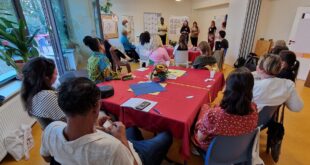Mali has blamed “external intervention” for the chaos that reigns throughout Libya given the NATO-led bombing campaign in 2011.
Addressing the European Parliament on Wednesday (22 November) in Brussels, Abdoulaye Diop, Malian minister of foreign affairs, said the raids were “carried out without a strategic vision, without a plan, and without the ability to manage the consequences.”
The bombing campaign included French and British sorties that helped topple the government of Muammar Gaddafi, plunging the North African into chaos from which it has not emerged.
Libya has since become the main staging point of migratory flows towards Europe and is home to some 1,500 armed militia groups. It’s this situation that allows persons and groups in the country to abuse the human rights of migrants, including trading in them in open slave auctions.
President Alpha Conde of Guinea on Wednesday in Paris also criticised Europe’s co-operation with the Libyan authorities. “The refugees are living in extremely bad conditions,” he said. “Our European friends were not right to ask Libya to keep immigrants (in detention)”, making reference to the EU co-operation with the UN-backed government in Tripoli.
Conde, who is also the chairman of the African Union, said he was “in contact with all leaders”, adding: “We are trying to find a solution, even if it means bringing all of our citizens home.”

Similar comments were made by Moussa Faki Mahamat, who chairs the African Union Commission. Speaking alongside Federica Mogherini, EU High Representative for Foreign Affairs and Security Policy, at a joint press conference in Brussels on Wednesday, he said the African Union had launched an investigation into slavery and migrant abuse in Libya. “At the moment, there is no state, there are no rights, there are no laws in Libya,” he said.
The investigation, he said, would include the help of people on the ground in Libya along with the support of the UN and EU.
UN human rights chief Zeid Ra’ad Al Hussein early this month had also accused the international community of turning a “blind eye to the unimaginable horrors endured by migrants in Libya” and called the EU’s policy “inhuman”.
The Malian minister and the AU Commission chief were in Brussels for talks with EU officials on the security situation in the Sahel region of West Africa, which is battling an Islamist insurgency. The talks at the European Parliament come ahead of an EU-Africa summit set to take place on 29-30 November in Abidjan and which will also dwell on the suffering of migrants in Libya.
Sola Jolaoso with agency reports
 THE AFRICAN COURIER. Reporting Africa and its Diaspora! The African Courier is an international magazine published in Germany to report on Africa and the Diaspora African experience. The first issue of the bimonthly magazine appeared on the newsstands on 15 February 1998. The African Courier is a communication forum for European-African political, economic and cultural exchanges, and a voice for Africa in Europe.
THE AFRICAN COURIER. Reporting Africa and its Diaspora! The African Courier is an international magazine published in Germany to report on Africa and the Diaspora African experience. The first issue of the bimonthly magazine appeared on the newsstands on 15 February 1998. The African Courier is a communication forum for European-African political, economic and cultural exchanges, and a voice for Africa in Europe.























